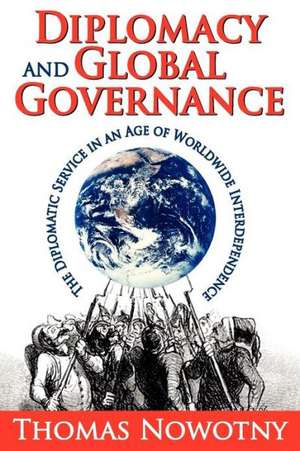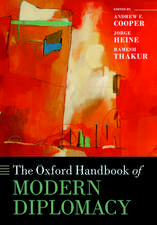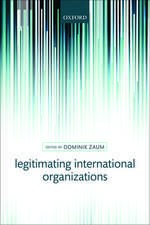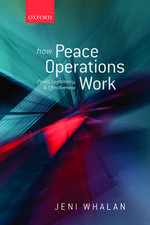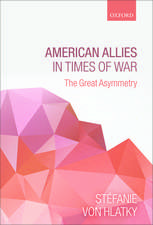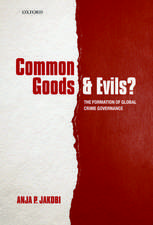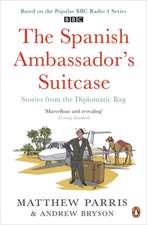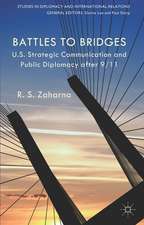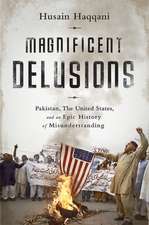Diplomacy and Global Governance: The Diplomatic Service in an Age of Worldwide Interdependence
Autor Thomas Nowotnyen Limba Engleză Paperback – 15 noi 2012
| Toate formatele și edițiile | Preț | Express |
|---|---|---|
| Paperback (1) | 406.41 lei 6-8 săpt. | |
| Taylor & Francis – 15 noi 2012 | 406.41 lei 6-8 săpt. | |
| Hardback (1) | 986.50 lei 6-8 săpt. | |
| Taylor & Francis – 15 mai 2011 | 986.50 lei 6-8 săpt. |
Preț: 406.41 lei
Nou
Puncte Express: 610
Preț estimativ în valută:
77.80€ • 80.02$ • 64.55£
77.80€ • 80.02$ • 64.55£
Carte tipărită la comandă
Livrare economică 15 februarie-01 martie
Preluare comenzi: 021 569.72.76
Specificații
ISBN-13: 9781412849586
ISBN-10: 1412849586
Pagini: 322
Dimensiuni: 152 x 229 x 17 mm
Greutate: 0.39 kg
Ediția:New.
Editura: Taylor & Francis
Colecția Routledge
Locul publicării:Oxford, United Kingdom
ISBN-10: 1412849586
Pagini: 322
Dimensiuni: 152 x 229 x 17 mm
Greutate: 0.39 kg
Ediția:New.
Editura: Taylor & Francis
Colecția Routledge
Locul publicării:Oxford, United Kingdom
Recenzii
According to Nowotny, multilateral organizations like the World Bank, the UN, and nongovernmental relief agencies are at least as important as governments and often have better technical expertise on staff. To succeed in this more complex setting, Nowotny recommends recruiting technical experts to serve in a country's diplomatic corps and establishing a -multilateral track- to allow some diplomats to specialize in working with other agencies ... By setting his real-world experience on an academic foundation, Nowotny has produced a thoughtful study that will interest those in the diplomatic services and those who hope to enter.- -- Marcia L. Sprules, Council on Foreign Relations Lib., Library Journal
Drawing on his experience as a diplomat, a scholar, and an astute observer of international politics, Nowotny has produced a book as wise as it is interesting. He offers an important and compelling vision of how to update the art of diplomacy to a changed and changing world.- --Charles A. Kupchan, professor of international affairs at Georgetown University and former director for European affairs at the US National Security Council
Thomas Nowotny has dared to write three books between two covers. Here is the autobiography of a seasoned and shrewd Austrian diplomat who has served in Cairo, New York, Paris, and London, as well as a personal adviser in Chancellor Bruno Kreisky's cabinet. His is also the profound analysis about recent transformations in global governance from the perspective of a well-informed political scientist. If this were not enough, he gives us the benefit of his experience as a diplomat about how today's national diplomatic services ought to cope with, and adapt to, a new era of multilateral diplomacy. This book is a real bargain--for the price of one you get a happy threesome of keen insights.- --Gunter Bischof, Marshall Plan Professor of History and director of Center Austria, University of New Orleans
What role is left for diplomats in an age of instant communications? Thomas Nowotny offers a sure and comprehensive guide to the continuing, yet changing, relevance of statecraft in a global age.- --Dan Hamilton, Richard von WeizAcker Professor, Johns Hopkins University, School of Advanced International Studies, director of the Center for Transatlantic Relations
By combining an insider's insights with those of a true expert's perspective on the necessity of global diplomacy in the early 21st century, Nowotny's book succeeds masterfully.- --Ambassador Wolfgang Petritsch, former International High Representative in Bosnia-Herzegovina
Drawing on his experience as a diplomat, a scholar, and an astute observer of international politics, Nowotny has produced a book as wise as it is interesting. He offers an important and compelling vision of how to update the art of diplomacy to a changed and changing world.- --Charles A. Kupchan, professor of international affairs at Georgetown University and former director for European affairs at the US National Security Council
Thomas Nowotny has dared to write three books between two covers. Here is the autobiography of a seasoned and shrewd Austrian diplomat who has served in Cairo, New York, Paris, and London, as well as a personal adviser in Chancellor Bruno Kreisky's cabinet. His is also the profound analysis about recent transformations in global governance from the perspective of a well-informed political scientist. If this were not enough, he gives us the benefit of his experience as a diplomat about how today's national diplomatic services ought to cope with, and adapt to, a new era of multilateral diplomacy. This book is a real bargain--for the price of one you get a happy threesome of keen insights.- --Gunter Bischof, Marshall Plan Professor of History and director of Center Austria, University of New Orleans
What role is left for diplomats in an age of instant communications? Thomas Nowotny offers a sure and comprehensive guide to the continuing, yet changing, relevance of statecraft in a global age.- --Dan Hamilton, Richard von WeizAcker Professor, Johns Hopkins University, School of Advanced International Studies, director of the Center for Transatlantic Relations
By combining an insider's insights with those of a true expert's perspective on the necessity of global diplomacy in the early 21st century, Nowotny's book succeeds masterfully.- --Ambassador Wolfgang Petritsch, former International High Representative in Bosnia-Herzegovina
Cuprins
1: Introduction; 2: Not Living up to Its Claims: Obsolete, Irrelevant, and Sometimes Dysfunctional; 3: Traditional Diplomacy and Its Operative Functions; 4: Diplomats as Symbols; 5: Confirming Identity through the Narrative on Foreign Policy; 6: Co-dependent: Discourse and Reality; 7: Beyond Its Usefulness: The Enduring Dogma of “Realpolitik”; 8: The Role of the Military and the Response to Threats and Risks; 9: From Anarchy to Cooperation; 10: Welded Together by the Economy: “All Politics Is Global”; 11: International Organizations: More Than Reflections of Narrow “National Interests” of Their Member States; 12: Moving beyond “Optimal Games”: The International Public Sector; 13: Non-Governmental Organizations, Nations without a Territory, and the Fractured Global “Polity”; 14: Public Opinion and Foreign Policy Elites; 15: Parliamentary Representation beyond the Borders; 16: Public Diplomacy; 17: Delocalization; 18: The Quasi-Governmental Function of Transnational Corporations and of Financial Institutions; 19: The State: Still the Crucial Hinge; 20: From Government to Governance; 21: Diplomats as Facilitators of Global Governance; 22: A New Setting for Diplomatic Activities; 23: The Diplomatic Service Needs to Adapt
Descriere
Traditional diplomacy is based on the notion of competing nation-states, each attempting to maximize its autonomy and independence
